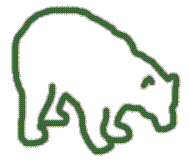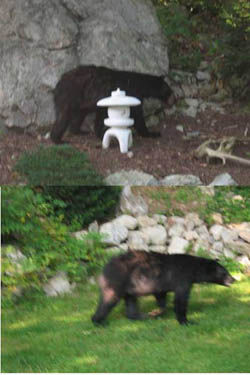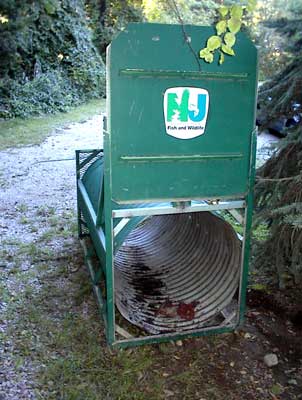 |
|
| Bears Native Animals of North Jersey |
|
| Scenery • Geography • Maps • Bears • Birds • Recreation |

The black bear population is growing steadily in North Jersey, so perhaps it is time to meet our wild neighbors! Bears are found throughout the world on all continents except for Africa, Antarctica and Australia. Bears are classified as the family Ursidae and are the largest members of the Carnivora order. They are related to pandas, raccoons and dogs. Bears lack the shearing teeth found in most carnivores, but have large molars that may be an adaptation to a plant diet. Other differences with members of the Carnivora Order include heavy bodies, short, rounded ears and five toes on the each foot. The North American black bear (Euarctos americanus), in spite of its name, can vary in color from almost pure white to a pure or bluish black. In the western United States and Canada, black bears vary from a blonde to a reddish brown or cinnamon color.
Black bears can weigh more than six hundred pounds (272 kg), but average around three hundred and fifty pounds. The females are slightly smaller, averaging around two hundred pounds (90 kg). A black bear's diet consists of mostly plants and fruit. They are opportunistic and will eat small animals, insects and carrion. Bears give birth every two years with one to four cubs born in winter dens. Black bears normally remain with their mothers until they reach 18 months of age and weigh approximately 60-100 lbs. Black bear dens are very difficult to find, sometimes being in the hollow of an upturned tree root or other natural cavity. Other then a female with cubs or during the breeding season in June, bears are solitary creatures. Bears are usually quiet, but they do vocalize with a variety of growls, coughs and sniffs in addition to whining sounds. When the animal is slightly annoyed, it may growl. The bear may also "huff" or "cough" or make a popping, snapping sound with its jaws while pawing the ground. This may be the time for you to back away slowly, as you are WAY TOO CLOSE! When injured or in trouble, a bear makes a heart rending, almost human moaning that Olaus Murie describes as "the most pitiful sound I have heard in nature". In New Jersey, black bears are making a remarkable recovery from their low numbers in the nineteenth century. Early settlers of New Jersey changed the landscape resulting in the black bear being pushed back into the more remote areas of the state. Now, the human population has expanded into these last refuges of the black bears. Black bears are now at a critical point where human tolerance and quality of habitat will define their future. The New Jersey Division of Fish, Game and Wildlife has made some
recommendations for the safe coexistence of people and bears:
Related Links
sources: - Living in Bear Country, pamphlet, New
Jersey Division of Fish, Game and Wildlife. |
|||||||||||||||||||||||||
Home • Scenery • History • Recreation • Home & Garden • Directory • Calendar • Classified Ads
• Maps • Scenery • Shopping
Advertise on rt23.com!
• Link to rt23.com!

Questions, comments, corrections? contact the Webmaster
 Black
bear foot prints are approximately the size of a adult hand. The
feet are plantigrade, similar to humans whereas the heel and sole
both touch the ground. The "big toe" is the outer one
unlike human "big toes" on the inside. A shallow bear
print may not show the smallest toe, creating the effect of being
four toed.
Black
bear foot prints are approximately the size of a adult hand. The
feet are plantigrade, similar to humans whereas the heel and sole
both touch the ground. The "big toe" is the outer one
unlike human "big toes" on the inside. A shallow bear
print may not show the smallest toe, creating the effect of being
four toed.
